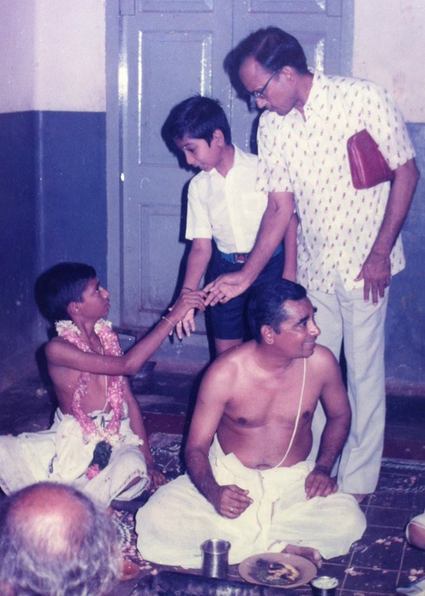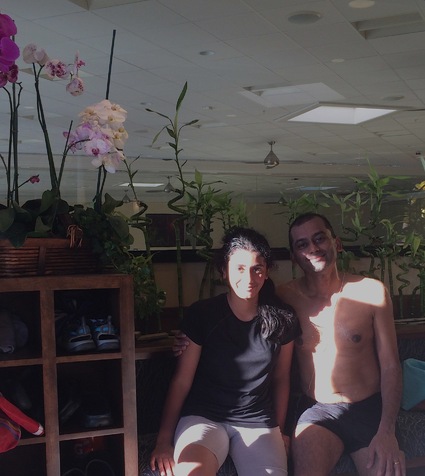Passing the right torches
 Sunday, April 6, 2014 at 7:46PM
Sunday, April 6, 2014 at 7:46PM It was thirty years ago when my parents decided that their two boys should go through the "Upanayanam" ceremony. For those western folks reading this in the US, it is like a "bar-mitzvah" for Hindu brahmin boys. A ceremony which involves getting a thread around their shoulders, that symbolizes their commitment to higher learning.
Said "higher learning" involved the following :
1. Sitting in front of a fire for hours and offering things into it and getting used to the heat
2. Learning the "Gayathri Mantra" which was to be used as a repetitive prayer
3. Learning to do "Sandhya vandanam" , a prayer done three times a day where we take water and throw it back in water and say different prayers as part of the 15-30 minute routine.
4. Learn to get blessings from elders the formal way by mentioning our "lineage" and understanding what that means
5. Understanding the relationship between doing certain rituals and its correlation to getting really yummy food in a Pavlovian way
6. Understanding that you are not a kid anymore and people look up to you all of a sudden to be more responsible because you understand 1 through 5!
7. Joining your grandfather or father in an evening prayer and making them proud without understanding what all the big fuss was about
8. Figuring out that the memory you have inherited comes in very handy when it comes to impressing your elders
9. This is something I forgot on the original list. The "Pranayaama" that was taught as part of Sandhyavandhanam. We were taught how to take in a breath with one nostril, hold it and release it through the other. On any given day we did this around 50 times.
There may have been many more but the one thing that I deliberately did not list was doing the "Sooryanamaskaaram" which is the Sun Salutation. After the main ceremony finished and just before we went of to lunch, after sitting in front of a fire for 3 hours, the priest took the two newly "poonal"ed kids to see the sun. He asked us to cross our fingers in a grid and look through the sun and said "as part of your daily Sandhyavandhanam, you kids look at the sun for a few second every day like this! This is the soorya namaskaaram".
Years and years later, I learned that the Sun Salutation in reality involved a series of forward and back bends which are combination of the Half Moon pose and Triangle pose in Hatha Yoga. It is not fair for me to criticize my parents, grandparents or the priest, who had not seen his own bellybutton directly, crossed fingers or not , over god knows how many moons. There was no way that dude was teaching me the real Sun Salutation.
Somewhere down the line, a ritual in a village setting that would have taught young kids to stand waist deep in water and do forward and back bends, lunges etc. with the spirit of teaching them "as water goes to water" so do you back to this earth, "here, sit and meditate and find some inner peace and while you are at it", and strengthen your body while doing all this changed to fit a context and lost a lot in the translation . I am guessing the running water must have done wonders for one's circulation and bowel movement.
My parents spent a lot of their savings on this very important ceremony. It was done like a wedding and the feast that followed made my brother and me feel like rock stars.
I still change my thread every year and commit to learning. Maybe just like the ceremony evolved from teaching lifes lessons to fit a modern day context and lost something in the evolutionary process, my commitment also changed.
I commit to watching at least one TED talk a week, reading one book or magazine a week and meditating for at least 10 minutes a day. In a way keeping up with my field of study and sticking to "Materials Science" after most of my classmates have found success in finance or software is my self delusional way of dedication to the "sacred thread".
The Pranayaama must have helped me for sure as I kept up with it for a good 10 years after the Poonal. Somehow I stopped doing it a year after coming to the US. Still don't know why.
Here is one of the few photos I happen to have from that ceremony where my friend and his dad are congratulating me and my dad shortly after the thing was over.
These days I am not religious. I think of myself as more of a spiritual person who believes in the goodness in all people. I am also trying to look inward in trying to find goodness in myself first before expecting goodness from ohters. Guess it is yet another change that the years and experiences bring to a person. Or maybe it is all the yoga on a daily basis that tries to work overtime outside the yoga room and search for context in everything.
This ceremony happens to be only for boys and we see the other kids in my family go through this ritual over time. I still remember one of my cousins pleading with my uncle and aunt to skip the ceremony, have a quiet thing in the house without all the expense and give the saved money to go towards a motorbike he really wanted. He was way ahead of his time. I was not old enough to support him in his noble and thoughtful quest.
These days the best I can do is to make sure the kids who are getting the "poonal" learn to do the Sun Salutation the right way, be it through the priest or some other person in the audience who knows how to do it.
Always used to wonder what kind of rite of passage do I give to my two little darlings. If I can teach them how to improve their physical and mental well being, what could we possibly teach them? This question had a big gaping hole for an answer till Bikram Yoga became a part of my life three years ago. Now there is no doubt in my mind on what I would like to hand over as a "torch" of sorts.
If we can get the kids to do yoga regularly and meditate regularly, they would be far better off than we are. To that end, Jr. is now coming with me to Bikram Yoga once a week. Granted it is not daily, but the fact that she kept this once a week commitment with some reluctance is still a big deal.
Today the room was a 110 F and she pretty much sat down most of the class, but she stayed in the room. So many people came out and said "You make your dad very proud for hanging in there and trying". Guess she was beaming with a smile, the same way when her young daddy was being congratulated for throwing things in front of a hot fire for 3 hours straight, after managing to repeat a bunch of things in Sanskrit with a perfect pronunciation and a complete lack of understanding.
Bikram yoga to Jr. may be the same thing as the Sandhya vandhanam was to daddy, but somehow deep down I feel that she is going to be a lot better off then me, in thirty years if she sticks to this routine. She does get to do 20 minutes of Pranayaama as part of the routine in class and this method will help her improve her lung capacity.
It will be the little one's turn in three years!



